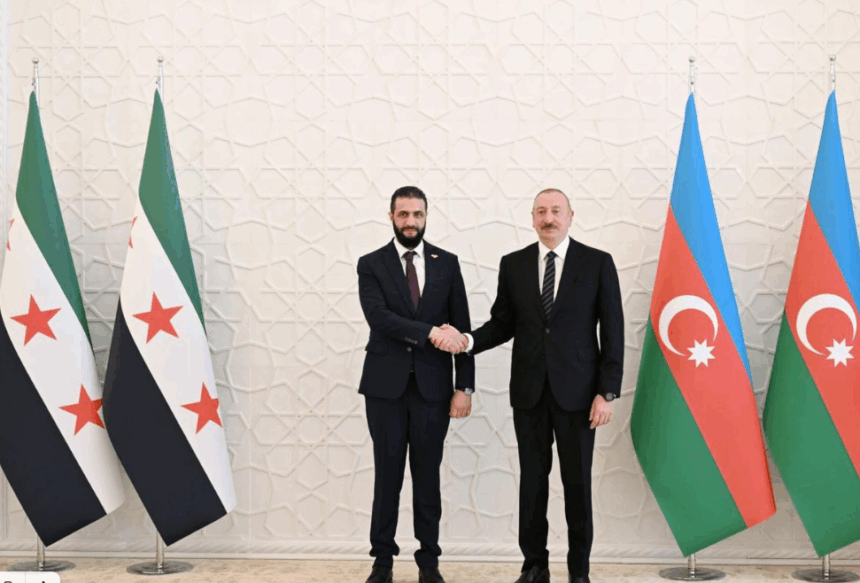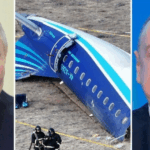The July 2025 visit of Syria’s interim leader, Ahmed al-Sharaa, to Baku was more than a cordial diplomatic call – it signaled a profound geopolitical shift reverberating across the Middle East and Eurasia. Sharaa, a former insurgent commander (better known by his nom de guerre Abu Mohammad al-Jolani) whose Turkish-backed forces ousted Syrian President Bashar al-Assad in December 2024 arrived in Azerbaijan to ink energy cooperation deals and cement a nascent alliance. In Baku, President Ilham Aliyev rolled out the red carpet for Sharaa and hailed a “new era” in Syrian-Azerbaijani relations. The two leaders pointedly blamed Assad’s past “unfriendly policy” for years of stagnation and pledged to revitalize ties. This public warmth – between a secular Shiite-majority Caucasus nation and a Sunni-led post-revolutionary Syria – would have been unthinkable a few years ago. Now, it underscores the emergence of a Sunni-aligned bloc centered on Turkey, Azerbaijan, and Syria’s new leadership, and it is raising alarm bells in Tehran and Moscow.
Sharaa’s Baku trip produced tangible outcomes that bind Syria’s recovery to Azerbaijan’s rising regional clout. Most prominently, a memorandum of understanding was signed for Azerbaijan to supply desperately needed natural gas to energy-starved Syria via Turkey. Officials on both sides hailed the gas deal as a lifeline for Syria’s war-battered electricity grid. Indeed, Turkey’s energy minister announced that the technical groundwork to pipe Azerbaijani gas from the Turkish border into northern Syria was complete – 6 million cubic meters per day will flow from Kilis to power plants in Aleppo. Aliyev also offered Azerbaijan’s expertise (earned from rebuilding its own war-torn Karabakh region) to help reconstruct Syria’s decimated infrastructure. Such cooperation would have been inconceivable under Assad, who aligned with Armenia and Iran; but under Sharaa, Damascus is decisively reorienting toward Ankara and Baku, a close ally to both nations, quietly midwifed this realignment: it even held talks in Azerbaijan with Israel – another Baku partner – to prevent accidental clashes in Syria. The budding trilateral partnership among Turkey, Azerbaijan, and Sharaa’s Syria is thus not only about pipelines and contracts, but about forging a new geopolitical axis.
Historical Shifts: From War Recovery to Realignment
This development caps a dramatic turn in Syria’s post-war trajectory and in Turkey’s regional influence. By 2021, a decade of civil war had left Syria shattered and economically paralyzed, even as Assad clung to power with Russian and Iranian support. The international focus shifted to humanitarian relief and reconstruction of Syrian cities, but Western sanctions and ongoing insurgency made recovery halting. Turkey, meanwhile, had spent the 2010s backing Syria’s Sunni rebels and carving out zones of control in the north. After 2020, Ankara embarked on a broader regional reset – seeking rapprochement with former rivals like Egypt and Saudi Arabia – yet it never abandoned its influence over Syrian opposition strongholds. Hayat Tahrir al-Sham (HTS), the Islamist rebel faction led by al-Jolani (now President Sharaa), quietly consolidated power in Idlib under an implicitly Turkish security umbrella. While Assad’s regime struggled to rebuild a bankrupt state, HTS-controlled areas incubated a new leadership aligned with Ankara’s interests.
The final act came in late 2024: Sharaa’s HTS fighters launched a lightning offensive, coordinated with other Turkish-backed militias, that toppled the Iran- and Russia-aligned Assad government. Suddenly, post-Assad Syria was no longer an extension of the Shiite “Axis of Resistance” but rather a potential Sunni ally for Turkey. Sharaa’s interim administration, born from insurgency, immediately pivoted Syria’s foreign policy away from Tehran and towards new regional partners. In early 2025, he visited Saudi Arabia and Turkey to garner aid and legitimacy. Those visits set the stage for his July trip to Azerbaijan, a country that had historically been distant from Syria but now saw opportunity in Damascus’s changing course.
Azerbaijan’s own regional role had evolved significantly since the early 2020s. After its 2020 victory over Armenia in the Nagorno-Karabakh war – achieved with extensive Turkish support and Israeli-supplied weaponry – Baku emerged more confident and assertive on the world stage. President Aliyev pursued a multi-vector foreign policy: deepening an alliance with Turkey and the wider Organization of Turkic States, expanding energy exports to Europe, cultivating strategic ties with Israel, and simultaneously maintaining a pragmatic rapport with Russia and Iran. Syria under Assad was a footnote (indeed, Baku had closed its Damascus embassy in 2012 amid the war), but Assad’s fall opened a door. Azerbaijan quickly recognized the new authorities in Damascus and even reopened its embassy there in February 2025 after a 13-year hiatus. Aliyev sent congratulations to Sharaa upon his assuming office and invited him to Baku, portraying Syria’s post-war transition as an avenue for “elevating relations…to a qualitatively new level”. In effect, Azerbaijan saw post-Assad Syria as both a market for its state oil company SOCAR and a geopolitical arena to assert influence alongside Turkey. By mid-2025, Baku was positioning itself as a critical bridge between the Caucasus and the Middle East – facilitating talks (as with Turkey and Israel) and now engaging in Syrian reconstruction as a stakeholder.
An Emerging Axis: Turkey, Azerbaijan, and the New Syria
Observers note that what is forming is a Sunni-aligned bloc knitting together Turkey’s regional ambitions, Azerbaijan’s energy wealth, and Syria’s post-conflict realignment. Ankara is the linchpin: under President Recep Tayyip Erdoğan, Turkey has cast itself as patron of Sunni causes and Turkic solidarity across regions. Turkey’s role in delivering Azerbaijani gas to Syria exemplifies how this bloc marries economic interest with strategic realignment. No longer just a transit corridor, Turkey is leveraging “energy diplomacy” to entrench its influence in Syria’s recovery. By integrating northern Syria’s infrastructure with Turkey’s grid and Azerbaijani supply, Ankara binds Sharaa’s government into reliance on Turkish goodwill. In parallel, military and diplomatic ties are growing: Turkish advisors are likely guiding Syria’s new army (largely reconstituted from rebel militias), and intelligence coordination with Ankara and Baku is expected to counter any remaining pro-Iran elements in Syria.
For Azerbaijan, alignment with Sharaa’s Sunni-dominated government is a striking departure from the past, when Damascus leaned towards Christian Armenia and Shiite Iran. Aliyev’s government frames its outreach to Syria in pragmatic terms – “brotherly support” for a fellow Muslim nation emerging from war, and a chance to expand SOCAR’s business. Azerbaijani analysts see a “geopolitical opportunity” to use economic engagement as a tool of influence in the Arab world. By investing in Syrian oil and gas fields and training Syrian engineers, Baku gains a foothold in the Levant and showcases itself as a neutral mediator. Indeed, Azerbaijan is trying to balance its Sunni-bloc partnerships with a careful posture toward Iran: it emphasizes that its role in Syria is “neutral” and not aimed at undermining Tehran. Few in the region miss that Azerbaijan’s closest friends now include both Israel and Syria’s new Sunni leaders, a juxtaposition that Armenian critics deride as a cynical “double game”. Yet from Baku’s perspective, it reflects a savvy “golden middle ground” – reaping benefits from all sides while a Turkish security umbrella provides cover.
Tehran’s Encirclement and Diminishing Influence
If any capital feels strategically hemmed in by this emerging axis, it is Tehran. Iran long counted Syria as a cornerstone of its regional alliance – a conduit to Hezbollah in Lebanon and a forward base against Israel. For over four decades, from Hafez al-Assad through his son Bashar, Damascus reliably partnered with Iran, cementing a Shi’a axis that counterbalanced Sunni powers. That alliance shattered with Assad’s fall. The rise of Sharaa’s government – dominated by Sunni Islamists hostile to Iran’s ideology – constitutes a major loss of Iranian influence.
The optics of Sharaa being feted in Baku – an oil-rich Shia-majority nation that has tilted toward Iran’s rivals – set off alarm bells in Iran’s media. Iranian newspapers across the political spectrum reacted to the Baku summit with a mix of concern and conspiracy. Some saw an outright plot against the Islamic Republic: Jam-e Jam, a state-linked conservative daily, argued that Azerbaijan, Turkey and Israel are “shaping new dynamics that work against Iran’s interests”. The paper pointed to reports that Israeli and Syrian officials held secret talks on the sidelines of Sharaa’s visit (facilitated by staunchly pro-Israel Azerbaijan) as “clear evidence” of a nascent anti-Iran coalition. Even more alarming from Tehran’s view were reports in Iran’s reformist press about Sharaa’s fighters potentially relocating to the Caucasus. The newspaper Arman-e Melli speculated that under the new Baku-Damascus partnership, battle-hardened Sunni militants could be transferred “through Turkey into bases in Azerbaijan” – effectively on Iran’s northern doorstep. Such fighters, it warned, might be tasked with destabilizing Iran’s borders or targeting the broader Iran-Russia-China axis. Another outlet, Farhikhtegan, concurred and added that Sharaa’s men redeploying to Azerbaijan might fulfill a US demand to expel foreign jihadis from Syria. In this scenario, Azerbaijan becomes a staging ground – either for infiltrating neighboring regions (like Iran’s ethnically volatile northwest or Russia’s Caucasus) or even for settling militants in territories such as Karabakh.
From Iran’s vantage, the strategic map is darkening. To its northwest, Azerbaijan (once cautiously neutral) now hosts not only Israeli intelligence presence but also welcomes Iran’s Syrian adversaries. To the west, Iraq remains a contested arena, but beyond that, Syria – which Iran spent blood and treasure to defend – has slipped out of its orbit and into that of Turkey. Iranian commentators speak of being “encircled” by pro-Turkey actors. They point at Azerbaijan’s close coordination with Turkey’s military (the two conduct regular joint drills) and note that Turkey’s influence now extends in an unbroken chain from the Black Sea to the Mediterranean – along a belt of Turkic or Sunni-led territories effectively walling off Iran. The anxiety in Tehran is palpable: Iran’s state media is urging countermeasures, such as strengthening ties with Armenia (Christian Yerevan is Iran’s one friendly land neighbor in the Caucasus) and doubling down with Russia to contain “Baku’s provocations”. The Iranian leadership, already facing domestic discontent and economic strain, must now contend with the reality that its arch-rival Israel and regional competitor Turkey are jointly shaping Syria’s future – without Iran. This strategic isolation is precisely what Tehran’s policymakers have long feared: a hostile Sunni axis on its borders, undermining the “Resistance” front and emboldening Iran’s ethnic minorities (like Azeris and Kurds) with visions of alignment against the Islamic Republic.
Moscow’s Waning Clout and Fears of Instability
Thousands of kilometers north, Russia is also unnerved by Sharaa’s reach into the South Caucasus – albeit for different reasons. For Moscow, the developments in Syria and Azerbaijan both represent a worrisome erosion of its influence. Vladimir Putin expended significant resources propping up Bashar al-Assad since intervening in the Syrian war in 2015. Russia’s airpower turned the tide of that war – until Turkey’s protégés reversed it in 2024. The sudden collapse of the Assad regime was a strategic and reputational blow to the Kremlin: it lost a reliable Arab client, the prestige of victory evaporated, and its military investments (including an airbase in Khmeimim and a naval facility at Tartus) hang in limbo under the new Damascus authorities. Sharaa’s government, dominated by a figure Russia once condemned as a terrorist, is at best coolly polite with Moscow. There are reports that the new Syrian leadership has quietly constrained Russian operations in Syria, insisting that Moscow draw down its troop presence. With Western sanctions and the Ukraine war straining Russia’s capacities, Putin has limited leverage to contest Syria’s new direction. In short, Russia’s clout in Syria is rapidly waning, just as Turkish and Azerbaijani clout rises.
Meanwhile in the South Caucasus, Russia sees the writing on the wall: its traditional dominance is slipping as a Turkish-Azerbaijani partnership fills the void. Ever since Azerbaijan’s 2020 Karabakh triumph (achieved partly despite Russia’s equivocation), Baku has grown more independent of Moscow’s dictates. In 2025 this trend reached a dramatic point – Azerbaijani-Russian relations soured over a series of incidents, including Baku’s arrest of Russian media operatives and a deadly Russian police raid on Azerbaijani diaspora figures in Yekaterinburg. Baku’s defiance and ever-closer alignment with Ankara signaled to the Kremlin that the balance of power in the Caucasus was tilting away from Moscow’s grasp. Now, Sharaa’s high-profile visit to Baku underscores that shift: Azerbaijan is not hesitating to welcome a leader who owes nothing to Moscow and, in fact, won his war against Moscow’s ally. This deepens Putin’s sense that an alternative power bloc – call it a “Turkic axis” or a new Sunni coalition – is consolidating in what Russia considers its near abroad. Russian analysts openly worry about a “trans-Caspian Turkic corridor” linking Turkey, Azerbaijan, possibly Central Asian states, and now extending influence into Syria – effectively outflanking Russia’s own Eurasian Economic Union vision.
Most unsettling for the Kremlin is the specter of pan-Turkic and Sunni identity politics seeping into Russia’s Muslim-majority regions. Russian officials increasingly fear that Ankara and Baku’s brand of ethno-religious solidarity could inspire Russia’s Turkic and Sunni populations in destabilizing ways. The Russian Federation is home to millions of Turkic-language peoples (Tatars, Bashkirs, Kumyks, Karachay-Balkars, and others) as well as Sunni Muslim communities concentrated in the North Caucasus (Chechens, Dagestanis, Circassians, etc.). The rise of a proudly Sunni-led Syria aligned with Turkey raises, in Moscow’s eyes, the risk of ideological contagion. Moscow’s propagandists have begun warning that pan-Turkic ideas are spreading among Russian Tatars and Bashkirs as Turkey-Azerbaijan ties deepen. They also point to the strong personal bonds between Turkish and Azerbaijani leaders, and now the symbolism of Azerbaijan hosting Syria’s Islamist president, as evidence of a coordinated strategy to champion Sunni/Turkic causes over Shia/Iranian or Russian ones. For the Kremlin – still grappling with an Islamic insurgency in parts of the North Caucasus that flared in the 2000s – the possibility that battle-hardened Syrian jihadists could relocate next door in Azerbaijan (or in recaptured Nagorno-Karabakh) is a nightmarish scenario. Even if Sharaa’s government has no intent to foment trouble in Russia, the mere proximity of an HTS-led administration and its fighters to Russia’s borders (via Azerbaijan or Turkey) is a security concern.
Russia’s response so far has been a mix of bluster and behind-the-scenes pressure. Unable to openly undo Azerbaijan’s choices, Moscow has resorted to shows of strength and warnings. The raids on Azerbaijani diaspora circles in Russia, accompanied by state-media vitriol against Baku, are one such signal. By cracking down on Azerbaijanis at home, the Kremlin hopes to send Aliyev a message about the costs of drifting too far into Ankara’s orbit. Additionally, Moscow has drawn closer to Iran and Armenia as a counterweight – a curious mirror image of the Turkey-Azerbaijan-Syria trio. Joint military exercises with Iran in the Caspian Sea and renewed arms sales to Armenia are likely in play as Russia shores up what influence it still has. However, with Russia bogged down in Ukraine and economically strained, its ability to reassert primacy in the Caucasus is limited. The worry for Moscow is that the genie of pan-Turkic unity and Sunni solidarity is out of the bottle, and that its own Muslim regions might eventually be tempted by these ideas – a development that could challenge Russia’s territorial integrity in the long run.
A Cautionary Turning Point
The Sharaa-Aliyev meeting in Baku thus encapsulates a new fault line in Eurasia’s geopolitics. On one side stands a tightening alliance of Sunni-majority states and Turkic partners – energized by shared interests in countering Iran and reducing Russia’s sway. On the other side, a nervous Iran and an overextended Russia find themselves increasingly isolated as old certainties crumble. The analytical consensus among regional experts is that this moment demands careful watching and management, lest it spiral into deeper confrontation. Tehran and Moscow are likely to respond to their losses not only with rhetoric but with counter-moves that could raise tensions: Iran might, for instance, double down on its ties to Armenia or foment unrest in areas of Syria or Iraq to bog down Sharaa and Turkey. Russia might seek to undermine the nascent Syrian-Azerbaijani partnership by leveraging its still-significant cyber and intelligence capabilities, or by stirring up separatist sentiments in places like Azerbaijan’s south (where ethnic Talysh and Lezgin minorities reside). The risk of proxy conflict is real: Syria’s new government could become a battlefield for influence if Iran or Russia attempt to destabilize it in retaliation, while the Caucasus could see new friction if foreign fighters or arms start flowing across borders.
In conclusion, Sharaa’s outreach in Azerbaijan marks an inflection point: a once Iran-aligned Syria now binds itself to Turkey’s orbit, extending that orbit into the Caucasus. The celebratory headlines in Baku and Ankara about “brotherly” cooperation mask the cautionary undertone of this realignment. It represents a significant strategic gain for Turkey and its partners, but it also carries the seeds of new conflicts.







